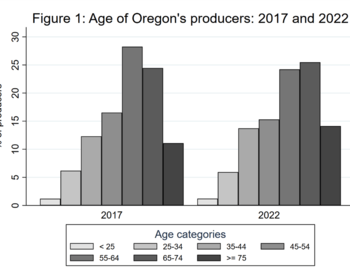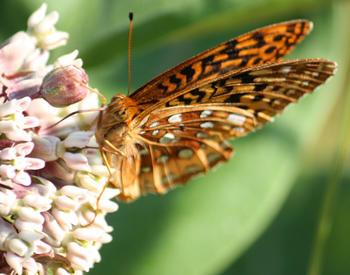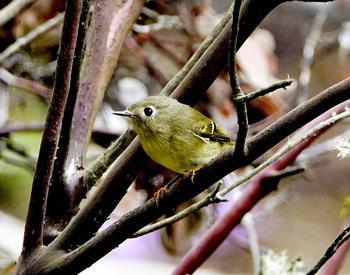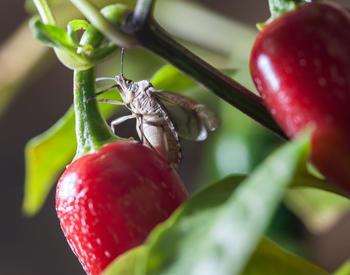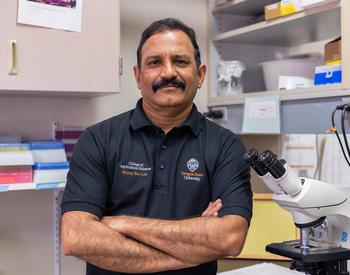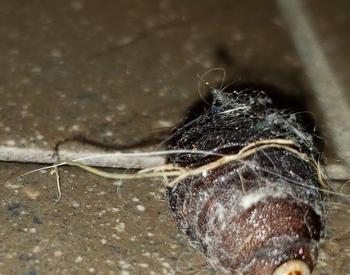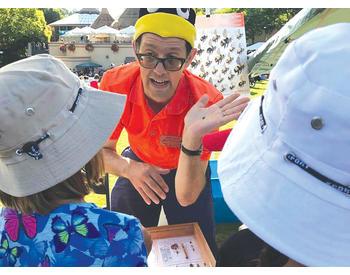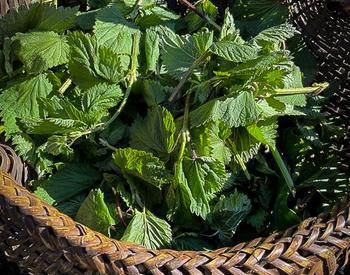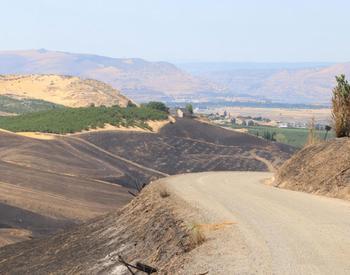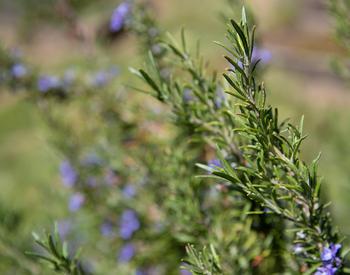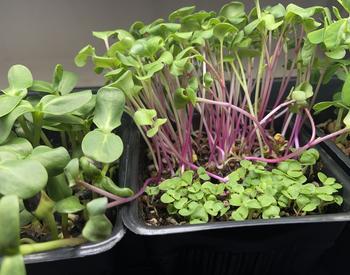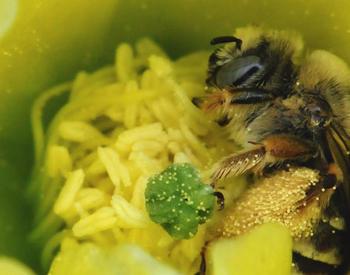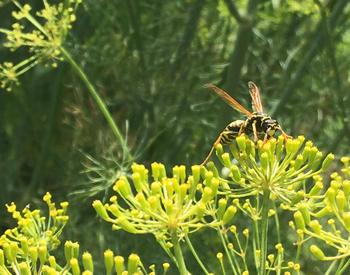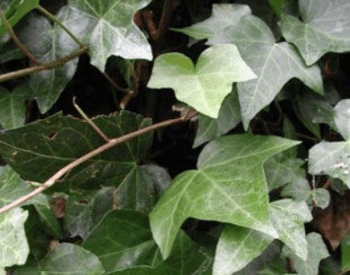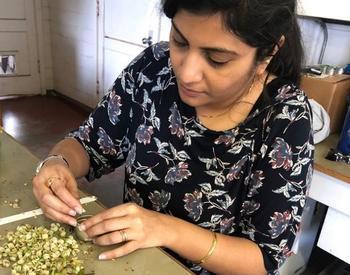Transcript
From the Oregon State University Extension Service, this is Pollination, a podcast that tells the stories of researchers, land managers, and concerned citizens making bold strides to improve the health of pollinators. I'm your host, Dr. Adoni Melopoulos, assistant professor in pollinator health in the Department of Horticulture. Today's episode focuses on bees and their social impact.
I'm really excited to have Sarah Common. She's the co-founder, CEO, and chief community officer with Hives for Humanity Society, which was founded in 2012 and looks to address a gap to connect at-risk populations to nature, to community, and meaningful work. Now, Hives for Humanity Society has coordinated partnerships between a variety of organizations and businesses, and it's developed some really exciting program that builds self-worth and community pride.
In this episode, we're going to hear about how the society got founded, some of the programs that it provides to the community, and some tips for other groups that are looking to do something similar in their community. So I hope you really enjoy this podcast with Sarah Common. Welcome, Sarah. Really glad to have you on the show. Hi.
Thank you. Tell us a little bit about Hives for Humanity Society. What's its mission and what personally drew you to combine bees with your work with at-risk communities in Vancouver? Well, we are a nonprofit society.
We're based in Vancouver, British Columbia. And really what we are working to do is to enhance communities through AP culture. And as we've been growing, we've kind of realized that really what it is that we're doing is connecting people and pollinators and really building a culture around the beehive that is inclusive, that celebrates diversity, that offers opportunity to people, and that specifically in this neighborhood in the downtown East Side where we are, is working with people living at risk on the margins to bring them back into caring communities from which they've been excluded or they've been disconnected. I'm looking forward to hearing you talk a little bit more about the downtown East Side. I actually had an opportunity to live in Vancouver in the 1990s, and I know the community somewhat well. I'm sure most of our listeners haven't.
But before we get to that, I wanted to ask you just more generally. You know, our episodes in the podcast so far have been about initiatives that really are focused on keeping pollinators healthy. And it seems Hives for Humanity tweaks this. You use pollinators as a way to also keep people healthy. Tell us what you've learned about how beekeeping can build self-worth and capacity in communities. Well, yeah, the bees and then the gardens that surround them and then the pollinators that appear in those gardens and that we can foster habitat and forage for. There's this incredible parallel between those pollinators, between those bees and those gardens and the human communities. You know, as we build diverse green spaces of respite for the bees and other pollinators, those spaces are places of respite and opportunity for people. So actually what we're finding in the city and in this downtown Eastside neighborhood where people are facing barriers to stability, where people are living like in the margins of society, there's these little niches we can create around the beehive through the gardening where people can thrive.
And then we're finding that the bees are thriving too. So while we do come in from this like social support work perspective, you know, and you asked a bit earlier what it was that drew me to it. So it's that support work and that community work kind of angle that brought me to this community and was like a food systems angle that actually brought me into the community. And then growing to create opportunities for people like through these gardens to connect into community and to take ownership of that community and to grow the community that they want, you know, to take leadership and to make the community the thing that they want to see. There's incredible capacity in this community, you know, as much as it is vilified, there's this huge capacity for love and joy and creativity here. And people are really responding to the gardens and to the bees as opportunities to be the leaders that they are, but aren't always given the space to be.
That's really wonderful. I can just, you know, there is something when you have a blooming meadow or hedge, there's just something really wonderful about it and to actually have built it yourself and to, you know, have made it, you know, from a part of the city that may have not been tended before. That must be really a transformative experience. It is transformative. Yeah, it's so hopeful planting seeds.
It's so optimistic. And for people who spend their day to day in survival, you know, living, where am I going to sleep tonight? Where is my next meal going to be? How am I going to get through the pain of this moment to plan to seed that is going to bloom, you know, in a number of weeks and is going to produce flower, like in the future and is going to feed bees that are going to then, like, be pollinating food. Like, it's this really positive look into the future and an opportunity to care for something outside of ourselves that gives back to us. And so often people don't have that opportunity anymore to care for other things because they're constantly being told what they can't do because of, you know, they get judged for their behavior and they get told what they can't do. So, you know, you can't be a beekeeper because you're homeless. You can't make pills because you are homeless. You can't participate in this programming because you are living with barriers to mental health and addiction. You're too unpredictable.
You're too loud, whatever it is. The bees and the gardens have a way of creating this place where everyone can find their bit that they can contribute to, that they can build ownership over and that they can really, like, cultivate their hope and through that build their own self-worth. It's like amazing to watch people whose life experiences have taught them that they're worth nothing and whether that is through like, life physically and quite literally being beaten out of them and their self-worth being physically through like various forms of trauma beaten out of them or whether it's more like an emotional trauma, whether it's like a, you know, like a spiritual pain and then people finding themselves without the resources to recover from that, finding themselves then on the margins, then living in poverty and kind of trying to alleviate some of that pain with drugs that then build like street entrenchment, you know, as people get further and further entrenched. They, the sort of a snowball of then people stop looking them in the eye, then people stop hiding them. They're further and further marginalized and these gardens draw people out of that and give them a space where we say hi to them. The bees don't care, you know, as long as you're being respectful of the bees, they don't really mind where you sleep at night or what your behavior is.
Like if you can be present and give them your respect, the bees are very good at giving that back to you as are the gardens. Right. And then we build on those moments. So then somebody who's had a lifetime of feeling like they're worth nothing comes into the bee yard and holds this frame of, you know, hundreds of living, vibrating, incredible, you know, magnetic, colorful bees. And there's an interaction there and there's a responsibility there. And like having that moment where you hold those bees and you're, you're caring for them, that that builds self work, that experience and having that moment, even if you're just coming into the garden and spending some time under the Empress tree or, you know, maybe picking some mint and chewing on it and watching the bees forage the mint flowers, like these moments of connection, they reinstall in people a sense of value and working together around the bees, working together in collaboration and partnership in this really positive space, even in the midst of all of the chaos of the street, that, that builds self worth and then that self worth can be carried forward. I really believe that we need to feel like we're worth care to advocate for care for ourselves, to advocate for access to health supports, to advocate for better housing, even to do something so simple as like finding a meal that day, we really need to believe that we're worth that and, and what the bees are doing in this community, building that self worth, that then supports people in caring for themselves and caring for each other.
That's really, that's really remarkable. I love how that as you describe this, you know, the kind of work that you do, how interrelated the bees are with people and how they go in step. I certainly know that experience of, of, there's a kind of focus around handling bees that really, really can help with all the other things that, you know, you have in your life.
That's cool, right? Like, you have to be focused, you have to be present, you have to be thinking about the bees, because if you're not, you are probably going to trap a bee under your hand while you're not thinking and get stung. And so there's like this immediate consequence if you're not focused. And so we spend, when we do our APA, as we always talk with our people, when we do our APA tour, as we say, you know, be present, we're only going to talk about the bees, we're going to focus on the bees, I'll answer that question later. That's what are the bees doing right now?
Let's observe. And what we find is that people, people are able to do that, the bees are powerful, they're mesmerizing, and they draw people in. And that, that like alleviates this, like pressure that most people spend all of their days experiencing. And whether you're, you know, an executive chef or somebody living homeless, there's all kinds of pressure and stress that we all experience in the city. It's not unique to people living on the margins to be stressed. We, we all experience it.
And so it's, it's healing for all of us to spend time letting some of that go. And, you know, we've had reports that from some of our beekeepers where, you know, like, oh, my back was so sore all day, and that pain went away when I was beekeeping. And so I don't, the bees magically heal the aching back, but it's that they take your focus and shift it and shift it onto something positive and shift it on to something else other than your pain. And so whether that's like physical or emotional pain, the bees have a way of offering this transfer. And that's transformative, as you were saying, and that's like another, another thing that we can build on, you know, like, that experience of being able to let go of whatever baggage is you're carrying.
You can do that once, that's like a little tool set that then you can take with you and do in other places. And the people, people kind of interact with the bees in gardens in all kinds of ways. And one of the ones I love is one of our beekeepers. He now is beekeeping with us. The way he got started is he would just kind of appear in the gardens. He's not a huge fan of people, but he's not a sneak, not sneak in, but he would find his way into the yard as we were beekeeping or as we were gardening.
And he'd sort of sit down and he still does it. He'll sit down and sit right right in the front entrance very quietly and just watch the bees. And there's a number of people who we witness doing that, who just want to sit with the bees and listen to them and watch them and allow their mind to be absorbed into the activity of the colony. And it's meditation, it really is. So we call it like the meditation of the beekeeper. And we really encourage people to find, to find their access point to that meditation so valuable to slow down. And I don't think in this kind of culture we have this North American culture, it's pretty fast, hasty and high pressure.
So places where we can encourage people to slow down are far and few between. Describe where you are right now and you're preparing for something later today, later in an hour or so. Tell us a little bit about where the facility is. The garden that you were just describing part of the facility or is this another spot or? The garden that I'm describing is the Hastings Folk Garden. It's right at Main and Hastings in Vancouver.
And that's about five blocks from where I am right now. It's the location of our first colony which we put in in June 2012 before we founded the society, sort of our like pilot, which we did High Surhumanity out of. I'm at the space right now, which is at Princess and Powell. And it's our Brickson mortar location. So we just spent the last about two years actually getting it all figured out and built and improved and permitted.
And now we're doing the fun part which is activating it. So a couple of our, one staff and one student, a Prafican student are in the kitchen putting together a soup. And we're having our intermediate beekeeping course here later tonight, which my mom, our chief beekeeper Julia Collin is going to be teaching. One of the things we found is that there's sort of beginner courses and there's master courses and there's not really courses in between. And we get really interested in the in-between parts where there's gaps in education and then opportunity. So Bee Space is an active sort of education and resource and skills training hub where we have a little kitchen so we can feed people. We have workshop space so we can teach people. We have a retail front so we can showcase our honey and candles. And then we have little offices out back for planning growth.
Wow, it sounds like a busy place. And maybe before we take a break, just tell us a little bit about, you told us a little, you know, you started in that garden that you were describing earlier, the meditation garden. Tell us a little bit about getting the project rolling. What's been the hardest thing about getting this project off the ground and to where you are right now, which is really impressive. You know, I was thinking about this and getting it going wasn't hard because, you know, the garden was there. I'd been working in the garden and working in the community for a number of years.
I was looking for ways to increase opportunities for engagement in that garden, bring more people in, have more work in there, have more activity in there, add to the spectrum of opportunity in the community. And that was, yeah, that was in 2012. And I was kind of been having a lot of coffee dates with my mom and we were just, I don't know, getting a bit boring, like let's do something a bit more interesting together, mom. And then I was kind of remembering that she was a beekeeper and it's, I sort of have to laugh at myself when I look back on that because she's been a beekeeper for longer than I've been around.
You know, you don't always conceptualize your parents as people, like mothering or fathering rules. So kind of realizing I wanted to spend time with her, realizing that she was a beekeeper and that could be like such a beautiful way to learn from my mother and also create opportunity for the community. She somehow, I don't, like in the years I've been working in the community, so I've been in the density side for about six years, previous to asking her to teach me how to be at that tasting smoke garden. And almost every year we'd kind of had this mother daughter chat where a mother initiated chat where she would pull me aside and ask me why on earth I was in this community and ask me to leave it because she was worried. And I'd say, you know, no, I love this community. I'm learning so much from these people. It's like an honor to work in this community. I'm not leaving.
You should come hang out more and meet people. And so with the bees, that was kind of my way of actually pulling her in. She said yes, which was like placing some, some trust in me that, you know, that I would bring her into the community.
And so she came in and started meeting people. And at the same time, I asked my bosses at the time, the Portland Hotel Community Service Society, I asked them, you know, here's my idea. My mom's a beekeeper. I'll volunteer for it. We're going to come on weekends and keep bees. I think we're going to, you know, we want to place the trust in the community. We don't want to sort of steel cage in these bees.
So will you give us the support we need to buy the bees, buy the veils, buy the tools, build the enclosure? And they said yes. And that was really huge. Not like it was the first yes, right? Like, well, my mom was the first yes, but that was the first organization that said yes to the idea and gave us the space and gave us the support. It was so huge that they did that.
They just kind of said go for it. We love it. It'll, it'll be a new place where different people can connect. And so from that pilot, then we've been able to expand and build.
But it looking back, it was kind of easy to get going. And actually, the I think the real challenge is, is finding stability and sustaining now what we've built and really like finding a way to have it as a scalable model so that we can share it with other communities. And we're starting to do that, which is really exciting.
We're starting to see see other places where we can build this programming. Because there's isolation in cities and towns all over the world. And honeybees are all over the world too.
And while the wild pollinator is a different all over the world, you know, it's, it's really, it can happen anywhere this program. So that's, that's the real challenge is, is now kind of in year five, figuring out how to sustain it and finding the balance. That was great hearing about getting Hives for Humanity started and that challenge of being able to sustain it into the future. I'd like to get into a little bit more on, you know, pulling the pieces together, because it seems like you really have had to draw on a lot of resources in the community. And I know for a lot of listeners who might be listening to this and want to get involved in doing something similar, that must seem like a daunting task. Can you walk us through how you kind of pull the threads together to get this initiative off the ground so successful? Yeah, I mean, I think that the first thing was that there was an anchor, like I, for this garden, I was the, I was already in the community.
I already had the trust of the community. I had relationships. There was a program going. I knew the neighbors.
And that was so important. When I started asking the community, what about bees? What about beekeeping? What's your bees?
Couldn't that be cool? People were saying, okay, Sarah, you've been around a number of years. I know that you, you know, I trust you. I know you.
Yeah, let's do it. That sounds really cool. People are really excited in this community about opportunities to work and to share skill. And so having that knowledge and having an understanding of the community was really key. And then bringing in somebody who was an expert in the beekeeping was it's kind of the part to pair with that. So having an anchor in the community who has the trust of the community and has the community expertise and knowledge and then somebody with the beekeeping expertise. Because bees are really complicated as beekeepers know, you know, we, we never stop learning. We continue to make mistakes.
The bees are continually surprising us. So you don't want to take that on without the expertise on your side. So it happened that it was me and mom in this case, right, like this kind of pairing that was really exciting for growth in our personal relationship, and then also allowed us to start this organization and get these programs going. But as we've moved to other communities and other partnerships, I'm not that anchor.
I'm not that relationship holder. So always as we expand, when we look at a new partnership, it's finding the person on the ground who is present, who knows the people, who knows the layout, who knows the resources and who is going to be the advocate for the program, and going to be anchor for the program. And then finding the beekeeper, like so then now we have a team of beekeepers. But one of the things that's been like so amazing about this project is seeing how the beekeeping community has responded. So there's this, seeing how the down tiny side has responded to the bees with this enthusiasm and this ownership.
And it's like stepping up to the plate of stewards and ambassadors. And then there's the beekeeping community. And I think that beekeepers know about the magic of the bees and they know about the meditation of the bees. And for a lot of beekeepers, they feel like bees have saved them.
And, you know, in many different forms, like they've connected them to the community, have connected them to themselves, connected them to the land. So beekeepers get it. And they don't always have the maybe understanding of the social justice implications or opportunities in beekeeping.
But once I start having that conversation with them, they get it. And so the beekeeping community has been like incredibly supportive and generous. We have beekeepers from all over BC who come and get facilitated workshops. We have beekeeping partners who offer us space, who offer us space in their workshops, space in their honeyhouses. You know, the beekeeping community has really come forward. And I think that beekeepers want to share their bees and they want to share the magic of the bees.
And so when we've been going into other communities, like we did a consultation with a group in Halifax starting up a youth social enterprise around beekeeping and urban agriculture. Oh, wow. Yeah. And that was the key sort of conversation is like, so for them, they have the community anchor, they have the youth support worker who has the connection with the young people, has these people like these young people hungry for opportunity. And I you know, what he needs to find is the beekeeper. And I think it's, you know, share your story and the beekeepers are out there and find ways to bring them in and have them share their expertise. And so we do a lot of different models to make that exchange possible. So we sometimes will kind of have the bees, we put them into communities where they are kind of hosted or where it's a full educational program and having sort of flexibility and how you bring that beekeeper in and how you bring the community in. There's so many different ways that the bees offer opportunity for connection to education. And so it's really like understand the community and understand what the need in the community is and then build your program around those resources.
Identify the resources, the people, the key people, the funding opportunities, the social enterprise opportunities. Bees do really well in cities. There's diversity of flowers, people are watering their gardens, there's trees, there's greenways, there's parks. And the diversity of planting is really beneficial for the bees. So they have nectar flow almost all season, you know where in the country you're facing, there's plenty in the city, you have flowers almost all year and quite dense. So the bees do really well and you don't have the big risks of like big sprays and like the sort of agro industrial complexes in the city. And we've been having some testing done at UBC looking at what's in our honey and our honey is clean. So you know, the bees really know what they're doing.
And they are doing really well in the city. So there's a lot of opportunity I think to build around the beehive. And it's just like identifying those assets and then and figuring out how to pair them up. Yeah, and I guess that's that that is the lesson from this story so far, you know, just hearing about how you started you and your mother and really kind of straddling those two spheres and kind of as you move forward looking for other opportunities that have sort of an analogous situation and that the bees will do well in any city, it's a matter of, you know, finding the people. Yeah, it is finding the people and building the trust and especially in in communities where people are living at risk and on the margins, building relationships based in trust is really the skill set that has to be present. And so we we well, we talk but also we act a lot around offering dignity and offering respect. And through that building trust, so that individuals who have had their trust broken over and over again, can find stability and find a place of trust again through the bees and the gardens. And so yeah, that's that's really the key skill set I think in in working in communities where you're trying to reach out to people who otherwise are, you know, in isolation and on the edges, it's finding that that way to build those relationships of trust. And the bees are so good at that, like, you know, you you hang out around an apiary and you're passing frames of thousands of bees that can sting you hand to hand like that. Just that really simple act of doing a passing a frame is is an act of trust.
And going slowly with that and really focusing and honoring that moment is so is so powerful and really is again that word that transformation of, you know, realizing you can trust and realizing you do have skill and realizing you you can be a steward of the bees, you know, you can have this leadership role. Well, tell us a little bit about where you are. Tell us about the what what it looks like in the downtown East Side. Tell us it would be great to know about some of the beekeepers that have developed through through the program and what's it you know, what's it like to keep bees? You know, we were talking about bees can be kept everywhere, but what's kind of specific about keeping bees in downtown East Side? Well, in the downtown East Side, we people, you know, are often say like, what are you thinking? And how do you chain them up?
And how do you bolt them down? And, you know, people, there's like fear. And I think that's part of this like villainization in the media. This community is complex. There's complex health and social dynamics that the symptoms of which are addiction and like street homelessness.
But it goes so much deeper into our culture, the reasons that people are finding themselves in those situations without sort of that social capital to pull themselves out. What we are finding then is that the bees offer this place of connection and bridging people back in. And the kinds of people who are becoming beekeepers with us are the kinds of people who, in other circumstances, like you might not give a moment to, but then you meet them in the bee yard.
And if there's this one of our beekeepers, Jim, he was there on the first day when we got that first colony in and he's been every single day since. Oh, really? Yeah.
Wow. And so he started as a gardener. He started as a leader, a peer leader in his community. Jim's been in and out of stable housing over the years that I've known him and throughout all of it, he is so willing to share and so excited to learn and it's such an incredible learner and has so much understanding and knowledge and has just really keyed into this fascination with the bees that he's responded incredibly to the bees. And so he was there for that first colony.
It was actually a conversation with Jim around which we founded the organization. He's faced so much in his life and he survived so much and he suffers chronic pain and on top of that, because he found himself in and out of housing, living on the streets, really in survival over the last sort of, I think he's been in the community for 17 years. And so I've known him for 10 now. And he's an incredible beekeeper. He loves the bees. He's so meticulous and patient and gentle with them. He loves all the details of working with them, like cleaning the queen excluders, making sure the apiary enclosure is clean, making sure everything's just so teaching people and kind of furthering that cycle of education and bringing new people from the community into the yard, telling them about the waggle dance, telling them about the pollen.
And showing them how to hold a hive tool and showing them how to inspect a frame. Yeah, he in that first year, that first season, he was having a conversation with us where he was talking about next year. Can we split the colony and have two?
Could we put them at this other garden? Oh, so he was kind of, he was driving us. Forward, we were still kind of thinking, oh, it's awesome.
Now let's extract the honey. And he was thinking next year, especially for people living at risk and living with homelessness and living with addiction, it's often moment to moment, meal to meal, not this forward thinking, hopeful, sort of tone to conversation. And so when he was talking like that, mom and I kind of checked in after that conversation and she was like, was that significant? That's probably significant. Was that meaningful?
I think, right? Wasn't that meaningful? And I was like, yeah, that's huge.
Like to have built hope through the bees, to have someone thinking of hope about the future instead of with fear or dread or just not even able to put any energy towards that was really significant. And, you know, now Jim helps me in our workshops. He co-facilitates.
He works alongside the professionals who come in, you know, like Mark Winston's come a number of years, done guest workshops for us in our downtown APA's and Jim works alongside him. And the beautiful thing about, or one of the beautiful things about that is that the APA is this sort of like substrate for quality or for equity, like that we can have this place where a professor and a, you know, award-winning writer and this guy of international repute is working alongside somebody who wouldn't always like have that opportunity, would often be judged for his appearance and not given the chance to be a leader, but in fact, you know, is a leader and has this knowledge. So it's really exciting to see how the bees empower people to be leaders and how they empower people to, like through that leadership educate their peers and really be ambassadors and stewards of the environment. Now it seems like there's what you've done a really great job of is being able to create these opportunities for people that is welcoming. People can come in and feel trust that they're going to be, you know, given opportunities. But you also have created, it's an amazing array of different things that you guys do.
Can you just walk us through? I mean, one of them is happening this evening as you were talking, beekeeping education, but you're also doing stuff with other pollinators and making some great products. Tell us a little bit about all that. Well, really, we believe in this culture of the hive and therapeutic culture and the spectrum of opportunity that we can build around the beehive. So we have the beekeeping at the center of that and that therapy and that meditation and that hope that those bees generate. But out of that comes honey, which needs to be extracted and filtered and bottled and jarred and sold. And so there's all these opportunities for training and work along that line. There's all the wax, which then needs to be rendered and poured. And there's training opportunities along that line, too.
There's also, you know, the cleaning and the care of all the equipment, the watering and the care of the gardens. There's this, we can really stretch it out. There's opportunities for poetry and for art around the hive. There's this working in the kitchen, bringing the products of the hive into the kitchen and the products of the garden into the kitchen. And so we're always trying to think of ways where we can build an opportunity for connection, opportunities for training. And the bees are so wonderful at giving us so many opportunities for that.
So some of the things like some of the programs we're working on right now, which I'm really excited about, is a partnership with a cooperative, a workers cooperative and then whoever the woodshop workers co-op and what we're doing with them is we are employing people who we meet in our gardens through the bees, employing them to come to the woodshop and salvage wood waste. So old mattresses, old pallets that would otherwise be going to the dump. We rescue those. We pull all the staples and nails out of them. Out of that, we get lumber that then we create training opportunities to learn about how to process that lumber into products and assemble products. So we're making hexagonal shelves and we're making cute little like A frame, Nates and Bee houses and we're making planter boxes for putting into our partnership sites to grow forage for wild bees and food for humans.
Wow. And then those products and create revenue for the programming which the society delivers all over the down company to provide in a non-profit context. So it's doing a thing that creates opportunity on so many levels that has a social impact and environmental impact while also having this really strong potential to be self-sustaining. And it's really exciting to see people making those connections like the pride of some of the guys like Harley and Kevin who came out with me and Chris to the mattress factory and ripped all these mattresses apart, brought them all back to the woodshop, pulled all the nails and staples out, split that wood, made it into planters, took it to our partnership at, we have a partnership with a brewery in town, Big Rock Urban Brewery.
Took it to Big Rock, assembled it, put the soil in, grew the flowers, then came back and did workshops with the bees and with the public saying like, we did all of this, you know, like we just would have this apiary would have been in the garbage dump. But instead it creates this whole community and this like super interconnected system that there's so many, there's so many places along the way where we're learning and where we're sharing skills. And it's so exciting to see the people from this community have that opportunity and then be able to share with pride the things that they're accomplishing and be this model. Like that's an innovative model that like we've created just out of like this really grassroots kind of like, huh, we need wood, but let's not buy it.
Let's make it happen ourselves, you know. So that's a project I'm really excited about. And I think like we've threw a lot of the different places because then those wood products get finished with a beeswax conditioner that Oh, wow.
one of our beekeepers Ian who bee keeps all summer and then all winter he pours candles and makes salt and wood conditioners, you know, the there's so many like layers and places we can build opportunity around around the bee hive. Well, I just before we break here, I just wanted to you've talked a little bit about expansion and how you're building into new communities. And just give us a set of where you're headed. Where do you want to be?
Where would you like to see hive for Humanity Society in the near future, but also like maybe five years from now, what would be your ideal kind of place for you to be? I would love for us to be at a place where we're able to, you know, really, that all of the work that is being done to make the society make the program's work is being acknowledged and compensated fairly. So right now, we're still we rely on a lot of passion from ourselves, from our core staff team, and from the community to make everything go. And that's sort of this, this piece that we're trying to figure out is to be sustainable, we really need to be able to acknowledge all of that work and not just rely on passion. So getting it to a place where it is truly, you know, self sustaining and where it's then a scalable model is is where I'd like to see it in five years.
I think that's realistic. We can do a lot of work, understanding our business model, you know, and figuring out where where the places and where the partnerships are that we want to pursue and grow. And we're, you know, and honoring the partnerships we have established over the last five years with our core partners in the Downs County side, and with the businesses who are starting to really support us to, you know, we, we like love partnership.
And I just we truly believe we're stronger when we're partnering and collaborating with other people in our neighborhood and growing this network of local economy of socially sustainable and environmentally sustainable economy. And so I think having all these programs, robust and growing people through them to build sort of their their tool kits that they can carry forward with them, like, and including things like self work in that toolkit, you know, so yeah, if we can, if we can do that, if we can get it to a place where I can, where I can have have it at a place where I could hire someone to do my job. So, you know, if I could get us there in the next five years, I think that's really the goal to have it so that it's a system that I can hire somebody else to do my job and to do the chief speaking for my mom's job. If I could, if I could make it for those two jobs were able to be packaged into a job description.
That would be incredible. And that's our goal. Because that it's once you can do that, that I think you can call yourself sustainable. And so that's, that's where we want to be, we want to be able to, to share this model and see it happen in other, in other communities.
Okay, well, we're back. And I just want to pick up on something because I can completely understand, you know, that long term horizon of being able to be sustainable. And I'd like to hear you talk more about it, because I imagine for a lot of organizations like yours, there becomes this thing where you're always just chasing these grants, and you're just, you're not getting paid, and you're just writing grant after grant after grant. Can you walk us through the kind of perils and the ways through that, that, that problem? Yeah, it's been a really, been a steep learning curve, the understanding of grants and understanding of how foundations and funders work. And it's, yeah, it's a system that is project based that you're always chasing. And you, you, you work so hard to argue that your program is valuable, then you do the work delivering it. And while you're trying to then to capture and quantify the impact you're already having to start chasing the next, the next grant, the next project, and it can be exhausting. And for the long term, it's, it's not sustainable. So we've really been trying to work on, on figuring out where, where we can create revenue that is and so really nice with the bees is the honey is the wax is the pollination is the sort of traditional beekeeping services and products.
Yeah. But what is, I think, added value for us is, is the social impact and really sharing that story of the impact that our programming is having so that when people are buying our products, they are for sure supporting, right? So there's so much potential there through storytelling, to share the social impact of what we're doing.
But more and more, it's trying to figure out where, where services are too. So in, you know, putting together these educational packages, these, these programs, and putting together these products that create employment and fill our mandate, but also create revenue, then, and then really understanding to what the cost of our programs are and where we can bring that cost down and bring our efficiency up. And so that instead of having to chase grants, we can try and focus on those revenue generating items. I think that one of the things I really learned to is through the, through all the grant writing I've been doing over the last five, six years, seven years, I guess, if you know, if I go back to before, how to humanity is how important relationships are and how, how important fostering relationships with funders are so that you are not doing so much chasing without really knowing what you're chasing. And so that instead you're cultivating relationships, then it's a conversation before the application and really like learning to understand what you're bringing to that foundation or that funder.
Well, you know, it raises, it raises the question as well that you have had to sort of navigate and learn all this. But if you had, if you were to make a recommendation to cities and foundations on how they could better provide this kind of stability, because I can imagine trying to do it off of sales also has its challenges. What can cities and foundations do better?
I think totally change the entire system. I think the reporting part, I think that what happens is the foundations and cities are overworked too. And, you know, so we're all overworked and under supported and that cycle like just keeps going somehow. And so we focus on the front end a lot. And then the program delivery, you know, that after the program delivery, the reporting and the sort of sharing of the successes, I think that I think the cities and foundations could focus more on the sharing of successes and the networking of the organizations or the program so that, so that we're building a network and sharing resources among the network. So, you know, if I'm doing beekeeping and gardening, and there's another program that's been funded that's doing, I don't know, like bicycle training and off connecting our participants to that other program and seeing what resources can be shared. I always, I always really wish that there was more of that and more of that supported by the funders so that we could be understanding what resources exist and what other programs are being supported and how we can collaborate. I think that there's a scarcity of funding and that the response to that shouldn't be competition, it should be collaboration. And I think that supporting collaboration and really encouraging the network to grow would be a thing that could be done better. Like it's often feels kind of rushed. And we're already thinking of the next year and the next funding so that time isn't spent as much on the follow up end as it is on the like so much scrutiny at the front end.
And then not so much at the other end. I also think that I mean, I don't think there could ever be a uniform set of questions, but it would be so nice if somehow there could be more alignment around the way the questions and the structures are faced, because I'm forever rewriting, you know, and I would be so dreamy to be able to like have a structure that was shared, even within foundations, the structures can be so different for the different crafts and you're spending so much time writing. I don't know if that would ever be possible. It would be and I, you know, on the science end, we have suffered from the same set of issues, but it's it is always frustrating. And I guess, you know, the one thing I wanted to end on was this issue of networks, because that seems like a really sensible solution as well. In light of all of there's different skills in a city, but it seems like what exists for networks amongst groups like yourself that work with bees in the city and sort of social projects like this? Are there other organizations like this in North America? And how will you guys, is there some way for you for these initiatives to connect? Yeah, I think I think there are and we're starting to see more of it. We've done a couple of consultations with programs starting up sort of like minded using bees and focusing on social enterprise.
I mentioned that one out in Halifax and there's another in Victoria. And I, as I talk and as I meet with more people, I start learning about more and more projects. And I think sharing tools, you know, like we have this sort of checklist that we use in our APRAs, and we have a risk assessment that we use when we're forging new partnerships. And we have sort of template signage for our APRAs. And so we're always sharing that because why do all of that again?
Why not share it? And I think building this network of people who are sort of through bees and gardens, offering social connection and opportunity. I think there's so much potential to build that network. So it's starting to come together.
And I think there's like a couple of things that I'm hoping to do. Like I really, I met at the audacious, I met a woman from AP Mondia, and I'm really hoping that for the 2000, I think it's 2019. Yeah, in Montreal. In Montreal, that we can do like a social sort of, I don't know, a symposium of some kind of people who are, yeah, so to invite people to come and talk about their projects, talk about their ideas, share resources, and have this conversation about the social impact of beekeeping, because it's often missed. Like, I often feel like an outlier at beekeeping meetings and beekeeping conferences.
And yet, once I start talking with those beekeepers, they get it. Like I was saying before, you know, like, I think that we, if we start putting it on the agenda, I think that we'll see a lot of people coming out to take part in the conversation. And I really think that, you know, bees are facing all of these pressures and stresses and beekeeping is really changing. And there's a lot of conversation about how we can sustain beekeeping and how we need to change the way we're practicing beekeeping, as well as kind of advocating for change in the agricultural, industrial agricultural sector, as well as advocating for change in like environment and habitat protection. And I don't think that we can do the environmental piece without doing the social piece. I really think that both, both pieces need to be there. I don't think we can have a sustainable approach to our ecosystems if we don't have a sustainable approach to our communities. And if we're not being inclusive of our communities, and caring about each other, I'm not sure if we can ask people to care about the world around them. You know, I think that both pieces have to be there. And I think that beekeeping is such an amazing place where there are all those intersections of culture and environment.
The bees like are literally this connecting piece between the land and the sky, and the water and our communities, and they're sewn into our culture. So I think that would be really exciting to see that happen. And there's already been interest from maybe Nandi and I think that's going to happen. So I want to take it there and I want to continue having these conversations where we talk about people and pollinators as parts. Well, dear listeners, you will be able to get ahold of Sarah on our show notes. We have a link to Highs for Humanities website and some other things that Sarah has mentioned during the podcast we're going to highlight on the show notes.
So please check that out. And one thing we end each show with Sarah is we ask each of our guests three questions. And the first one is, is there any kind of book? And I guess we often ask people, is there a book that's been really influential or important that readers should know about in terms of pollination or pollinators?
But you may have another set of, in terms of social enterprise or social, this kind of work at risk communities. Is there a book that you would recommend? So my first memory of these from books and a book that I still love and have in my collection on the beekeeping side of things is The Bee Man of Orn. Do you know that one? Oh yeah, Maurice Sandback illustrated it. It's awesome. It's so good. And he carries around comb and bees in his pockets and learns about who he is and realizes that he is who he should be. So I love it for the story of acceptance. And that acceptance of who you are and that you have a place in the world and just be who you are is such a strong story. And I love that, like looking back on that book, I feel like that's what we're doing now.
So it's interesting to look back on that. A brilliant suggestion. I love that one. My more adult beekeeping book that I go back to all the time, like anytime I'm going to do a presentation, I check back in with Biology at the Bee, Mark Winston's Biology. I love using that as a reference book. So well written.
But all the time. But yeah, that question of like on the sort of social side, there's this book called In the Realm of Hungry Ghosts by Gabor Maté. And it's really these stories of these people from the down tiny side from his experience, the doctor on the front lines in this community working with addiction, working with people who have suffered like unspeakable trauma in many cases, or in many cases just like trauma that kind of came of unlucky circumstance, you know. And just these human stories he tells kind of woven in with his own story and the understanding that it lends to like what is addiction and how does that happen and how do we then care for people and create understanding. I think it's just a profound piece of writing, but not just for people who are in social work, but for understanding kind of the world and for everyone. It's a beautiful book in the realm of Hungry Ghosts. Okay, I was going to ask you for the title again.
That's great. Well, we will link, we'll find the titles and we'll link them in the show notes. But the next question that we have is your favorite tool for doing the kind of work that you do with pollinators. You know, I sort of spoke to it earlier and I really do think it's this tool of being able to build relationships based on dignity and respect.
I think it's like it's not like a literal physical tool. But I do think that that is key. And when I have people come to volunteer for us or when I have people who are coming as practicum students or when I'm doing tours or when I'm trying to foster relationships in new communities or kind of scale out what we're doing, working with pollinators, I think that that's so key. And I mean, it's even key in, you know, if you're working with wild bees in a garden, like having that respect for who they are, working with the honeybees, giving your respect to the honeybees, and then working with people just like offering everyone a chance to participate with dignity wherever they're at without judgment. I think that that's the central tool for me. That's wonderful. That's really great.
And really ties the show together well. And our last question is a favorite pollinator species, your favorite bee, or maybe you have a favorite bee colony in your career? I do have favorite bee colonies. We name a lot of our colonies. That's a bit unruly at times. You know, we have an Elizabeth and a Mary, and we have a Beyonce and a Tiger Lily. Yeah.
And it's a lot of fun. I'm really fond of Elizabeth. She's our, was our first colony.
She's in that Hastings Folk Garden where I first started getting connected to land and connecting people to land in this community. Yeah, I just, I think that honeybees and the way they allow us to interact with them, and the way they're so amenable to such diversity of situations, the way that they're so integrated into our culture, you know, through, through the honey, through the wax, through candles, through fermentation. I think that I really believe in growing connection to land, food and community.
I think these are things that we have drifted away from. I think that the bees are this, you can, you know, follow them back to the land. And they, they connect us back to our culture and to our community too. So yeah, the honeybee, apis, malifera is still my favorite, even though she's not, not the local, but I think that she opens our eyes to, to the other kinds of bees.
I think that she's a vector for all kinds of education and potential. And I love that about the honeybee. Like, my eyes have totally opened up to all the pollinators as a result of knowing apis malifera. And I think that I, I mean, I, I see that happening in our communities to, you know, people, people often in our workshops, even, they don't know about other bees. They just know about the honeybee. And it's really fun to blow people's minds by telling them that there's 20,000 species in the world. So I think that, I think that she's an eye opener.
And I love her for that. Well, thank you so much. We really honored to have you on the show. And thank you so much, Sarah. Thank you, Anthony. Good luck tonight. Thank you. Thanks so much for listening. Show notes with information discussed in each episode can be found at pollinationpodcast.oregonstate.edu. We'd also love to hear from you and there are several ways to connect. For one, you can visit our website to post an episode-specific comment, suggest a future guest or topic, or ask a question that could be featured in a future episode. You can also email us at [email protected]. Finally, you can tweet questions or comments or join our Facebook or Instagram communities. Just look us up at OSU Pollinator Health. If you like the show, consider letting iTunes know by leaving us a review or rating.
It makes us more visible, which helps others discover pollination. See you next week.
Today on the show we explore bees and their social impact.
In 2012, Sarah Common co-founded Hives for Humanity Society, alongside her mother, Julia, in response to a gap she saw in opportunities for connection to nature, to community and to meaningful work for marginalized citizens.
She has coordinated partnerships between a variety of organizations and businesses, developing programming that builds self-worth and community pride.
We talk about how it got founded, how it works, and tips for other groups looking to do something similar in their communities.
You can Subscribe and Listen to PolliNation on Apple Podcasts.
And be sure to leave us a Rating and Review!
“We are looking to enhance communities through apiculture.” – Sarah Common
Show Notes:
- How beekeeping can keep people healthy as well
- What her organization does to bring together marginalized communities
- How planting seeds creates a transformative moment for disadvantages communities
- Why you have to be focused when handling bees and how it helps people stay present
- What’s been the hardest thing about getting this garden project growing
- How she pulled together the resources to get this projected started in the community
- How the beekeeping community has responded to this project
- What is specific about keeping bees in this part of Vancouver, BC
- What the project is doing to collaborate with professors and other experts
- Where they want the Society to be in the future
- How to get the project to a point where it will be self-sustaining
- What foundations could do to better support the organizations
“Holding a frame of hundreds of living, vibrating, colorful bees creates an interaction and a responsibility that builds self worth .” – Sarah Common
